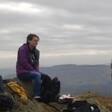Arts and Culture 21 January 2015

A special issue of the journal Biography – an academic publication from the University of Hawaii Press – launches this month with a focus on Palestinian lives.
Unlike many other academic works on Palestine, the contributors to this issue of the journal are almost exclusively Palestinian, and they explore issues such as diaspora, migration, confinement, oppression, nostalgia and longing through the lens of Palestinian life stories.
A three-part introduction by editors Cynthia Franklin, Morgan Cooper and Ibrahim Aoudé, titled “Three Cafes, and a Special Issue,” reflects on the impacts of occupation on Palestinian academics. The editors also discuss what it means to write and edit biography when Palestinians in Gaza are being killed by the thousands, and the relationship between the individual and history.
Each subject comes – as befits a journal focused on biographies – from a personal place. They range from that of the bearer of solidarities, the American wife of a Palestinian, sharing the humiliation and confinement of life in the West Bank, to that of the Jaffa-born Palestinian, looking back on a life in exile. The themes recur throughout the journal issue.
In his article ”Not Just a Picnic: Settler Colonialism, Mobility and Identity among Palestinians in Israel,” for example, Magid Shihade of Birzeit University traces issues of identity and belonging among Palestinian citizens of Israel through the experiences of inhabitants of the Galilee village of Kufr Yasif. What does it mean, he asks, for them to live “as citizens of a state that was built on the ruins of their own society”?
But in his opening paragraphs, Shihade also reflects on what it means to do biographical research amongst occupied and oppressed communities, as he considers the meaning of an encounter with the village’s imam:
While talking about the need for Palestinian input regarding the relationship between Palestinian society and the Israeli state, and the responsibility of Palestinian scholars to enable Palestinian voices to be heard, the Imam argued that no matter what Palestinians write, Israeli authorities and their western supporters will use this writing to their advantage, and to the disadvantage of the local community.
While some articles are creative or historical in tone, some are more directly linked to issues of resistance and solidarity, such as Sa’ed Atshan and Darnell Moore’s work on the links between black and Palestinian queer struggles, or Omar Barghouti and Falastine Dwikat on individual creativity and the boycott, divestment and sanctions movement.
Other contributions, meanwhile, cover a range of historical periods and experiences, ranging from Alex Winder’s “After the Nakba in Nuba: A Palestinian Villager’s Diary, 1949” to reflections on the recent book Gaza Writes Back by its editor, Refaat Alareer.





